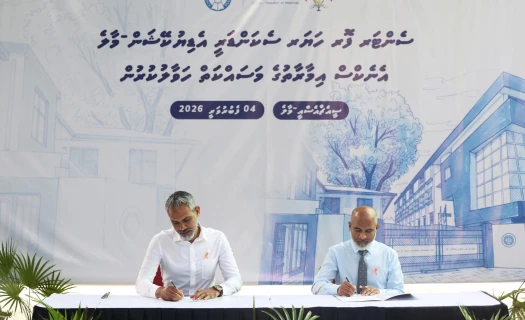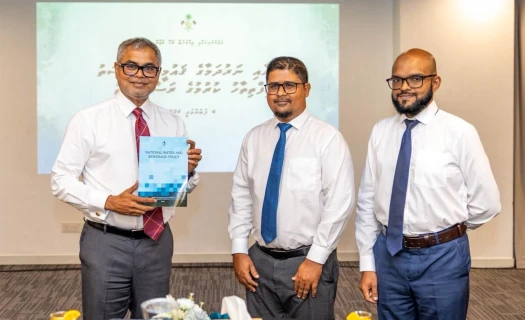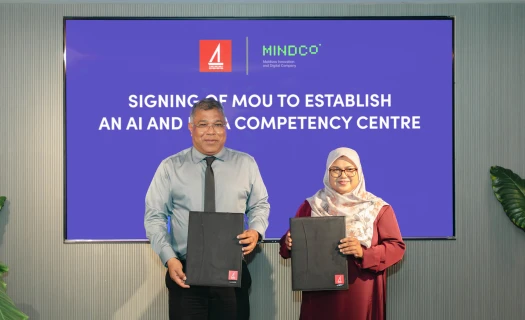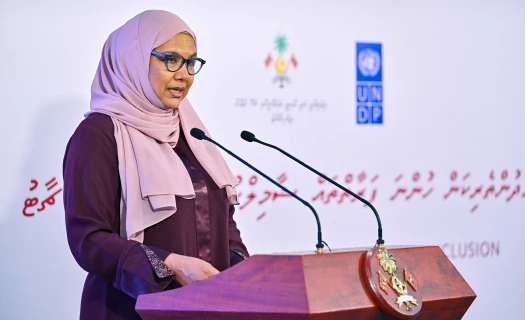Thu, 05 Feb 2026
|DHIVEHI
Forged in conflict, the Maldives edges toward democratic calm
05 Jun 2025
|

Photo: The President's Office
The journey of democratic governance in the Maldives has been fraught with turbulence.
Introduced amidst unrest, political conflict, and civil strikes, the transition from autocracy to democracy has not yielded the stability many had hoped for. Over the past fifteen years, successive presidential terms have been marked by deep-rooted political rivalry and repeated upheaval, leaving an indelible mark on the collective consciousness of the nation.
The dawn of multi-party democracy arrived in 2008, with the election of President Mohamed Nasheed, the Maldivian Democratic Party (MDP) candidate, following the end of a prolonged authoritarian regime. His ascent to power was bolstered by a coalition, which, however, quickly disintegrated. Within a year, former allies turned opponents, weakening the administration's cohesion and intensifying political discord.
Nasheed's government was soon mired in controversy. His efforts to summon former President Maumoon Abdul Gayoom before the police widened political rifts. Tensions escalated further when his entire cabinet was compelled to resign, creating a legal and constitutional vacuum. His decision to shut down the Interim Supreme Court and the arrest of prominent opposition leaders fuelled public outrage. Although his administration introduced important systemic reforms, including improvements in healthcare and taxation, the streets remained a constant theatre of protest and dissent.
Upon Nasheed’s resignation, his Vice President, Dr Mohamed Waheed Hassan, assumed office. However, this transition did not restore order. On the very day of his swearing-in, accusations of a coup echoed across the streets, with Nasheed’s supporters engaging in protests. Police stations, courts, and critical public records were destroyed in a wave of retaliatory arson. President Waheed’s tenure became one of the most volatile in the nation's democratic history, though he managed to retain power with the support of other political leaders.
The 2013 election brought President Abdulla Yameen to power, riding on the discontent with Nasheed’s leadership. However, his administration soon faced a fracturing alliance, as key figures like Gasim Ibrahim and Adhaalath Party leader Imran Abdulla defected to the opposition. The ensuing political instability culminated in the significant May Day protest, after which opposition leaders including Gasim, Nasheed, and Imran were arrested and some forced into exile and barred from contesting elections.
Yameen's presidency witnessed unprecedented internal strife. Both vice-presidents during his term were removed under severe allegations, including a suspected assassination attempt. A series of politically motivated prosecutions followed, targeting judges and even his own brother, former President Maumoon Abdul Gayoom. Despite this, his administration made strides in economic development and national productivity. Yet, the persistent unrest overshadowed these achievements.
With widespread political consensus against Yameen’s leadership, the 2018 elections ushered in President Ibrahim Mohamed Solih. While initially welcomed as a symbol of democratic restoration, his term was overshadowed by accusations of selective justice. Former President Yameen was imprisoned under contentious circumstances, prompting continuous protests from opposition groups. Development projects across the country stalled, and the government was perceived as more focused on neutralising political rivals than fostering national growth.
In contrast, the 2023 presidential election marked a potential shift in the country’s political trajectory. Dr Mohamed Muizzu, the candidate representing the PNC-PPM alliance, ran on a platform centred around reconciliation and the pursuit of national stability. President Dr Muizzu expressed a commitment to moving beyond the divisive practices of the past. Since assuming office, President Dr Muizzu has notably refrained from persecuting opposition leaders, ensuring a free and fair electoral environment.
Under his leadership, there has been a noticeable emphasis on safeguarding political freedoms. Over seventy protests have taken place without severe crackdowns or legal reprisals. In instances of public discontent, the Administration has generally favoured engagement over confrontation, responding to concerns raised by various segments of society, from youth groups to fishermen. This approach has contributed to a more measured political atmosphere, encouraging dialogue and easing tensions in a historically sensitive landscape.
In charting a new course for the Maldives, President Dr Muizzu has signalled a commitment to a path that prioritises inclusivity, dialogue, and civil discourse over divisiveness. This approach not only honours the democratic ideals once aspired to but also lays the groundwork for a more stable and participatory political future. The Maldives has a long road ahead in achieving true stability, but the road ahead presently looks promising.








